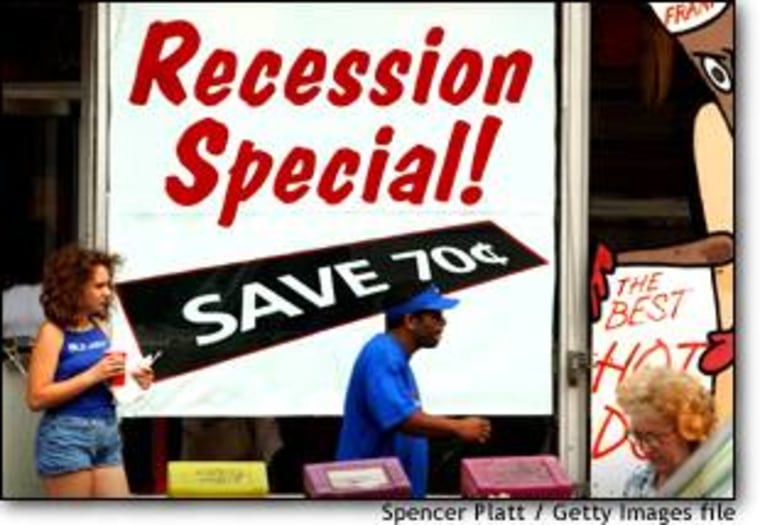A panel of leading economists, widely recognized as the official arbiter of U.S. business cycles, said Wednesday it is not quite ready to confirm what independent analysts have been saying for some time: that the recession of 2001 is history.
The National Bureau of Economic Research committee, in an update on its Web site, said “because of the divergent behavior of various indicators,” it needs more time to interpret recent economic activity and come up with an end date for the recession that began in March 2001.
Economist Jeffrey Frankel of Harvard’s Kennedy School of Government, a member of the NBER’s Business Cycle Dating Committee, said in an interview that there is a “pretty strong case” the recession ended in late 2001 and that the economy is in “expansion mode.” But he said the continuing decline in national employment levels, which have fallen for four straight months, make the current expansion feel like a recession to many people.
Despite the falling employment, economists who study business cycles generally agree that the recession ended late in 2001 or early in 2002. After two quarters of shrinking economic output, the U.S. economy has been growing for seven straight quarters, assuming, as most forecasters do, that gross domestic product has continued to expand in the current period, which ends June 30.
None of which is to say the economy is in great shape, of course. Even though the economy has been expanding for roughly 18 months, employers have been paring the workforce in recent months rather than adding workers as they generally do in an expansion. The nation’s gross domestic product has been inching ahead at a pace of less than 2 percent since late last year, rather than the 4 to 6 percent that is more common after recessions.
The sagging economy was a main factor motivating congressional support for a $350 billion tax cut package signed into law last month. And the Federal Reserve is expected to cut short-term interest rates next month for the 13th time since early 2001 in a bid to fuel growth. But given the excess capacity in the manufacturing sector and weak demand by businesses, the trend of subpar growth is likely to continue for some time said Lakshman Achuthan, managing director for the Economic Cycle Research Institute.
By all the measures other than employment, it is clear the recession ended sometime around the end of 2001, said Achuthan. Personal income is up 1 percent from its cyclical low, and manufacturing and trade sales are up 3.8 percent, he said.
Industrial production, which rose in May after declining for two straight months, also is slightly above its December 2001 low, Achuthan said. Employment, he said, would have hit bottom in December 2002 except for a call-up of some 200,000 military reservists for the Iraq war that distorted the numbers, he said.
“There is some expertise in deciding it, but it is a fairly objective set of criteria,” he said, referring to an ending date for the recession. “It’s not about how we feel. It represents a clustered movement of those four measures as they relate to various peaks.”
Objectively speaking, the economy is in a recovery, he said. “Just politically it can be very tough to say that when the jobs numbers continue to deteriorate, and I think that’s part of the struggle.”
The unemployment rate rose to 6.1 percent last month, its highest level in nearly nine years, and many economists expect the rate to rise further. In a survey released Tuesday, only 20 percent of employers said they had plans to add workers this summer, and 9 percent said job prospects will decline. “This quarter represents the weakest job outlook in 12 years,” said Jeffrey Joerres, chairman and chief executive officer of Manpower, which conducted the quarterly survey.
Treasury Secretary John Snow acknowledged that the jobless rate may rise in coming months but said the prospects for a vigorous recovery are improving steadily.
“I think all the markers are there for a strengthening labor market as growth accelerates this year,” Snow told a Money magazine conference Tuesday. “Conditions for this recovery are looking better and better.”
White House press secretary Ari Fleischer said the rallying stock market, which has gained more than 25 percent in the past three months, could be an indication that the economy is poised to accelerate.
After the last recession, the Business Cycle Dating Committee waited 21 months before declaring that economic activity had hit a trough in March 1991. The announcement was made in December 1992, more than a month after voters turned the first President Bush out of office in an election that hinged largely on the economy.
In its latest update, the committee said it would not make a decision on an ending date for the recession until “it concludes that a hypothetical subsequent downturn would be a separate recession, not a continuation of the past one.”
By most accounts, that point has passed. “The case is fairly strong,” agreed Frankel. “The question is whether we are completely sure.”
Frankel and the others on the panel are well aware that economic forecasters on Wall Street and in academia generally agree that the recession is long over, but the Business Cycle Dating Committee’s mandate is not to be fast, but definitive, he said.
